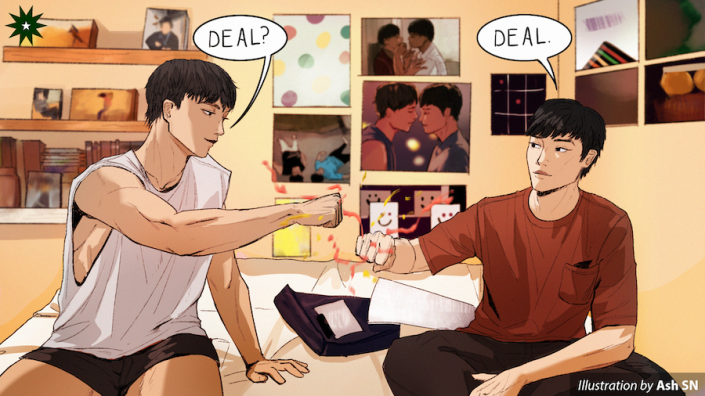Unspeakable dangers are regularly experienced by many in the LGBTQ+ community. From “casual” homophobia to outrageous hate crimes, the world shuns those who don’t conform to heteronormative ideals. Hence, it must be an overwhelming delight for LGBTQ+ audiences to experience the world of Thai boys’ love (BL) media, where two men are allowed to simply fall in love without any deep, underlying tragedy.
One of the genre’s standard-bearers is GMMTV, which has released a plethora of BL classics: Sotus: The Series, Dark Blue Kiss, Theory of Love, and 2gether: The Series. Their latest offering takes a spin on a classic romance archetype. Based on Afterday and -West-’s web novel, Behind The Scenes, Bad Buddy Series stars Korapat “Nanon” Kirdpan and Pawat “Ohm” Chittsawangdee as the starring enemies-to-lovers duo, Pran and Pat. But director Noppharnach “Backaof” Chaiwimol adds his own flavor of wit and emotionality that provides a memorable journey of juvenile joy, downfall, and eventual triumph.

New take, old classic
It’s a tale as old as Shakespeare: two star-crossed lovers stuck between the rift of their families hoping that young love would conquer hate. The series is set not in fair Verona, but in modern-day Thailand as Pran and Pat struggle to reconcile their parents who are involved in a business rivalry. While this premise seems too familiar, Bad Buddy Series manages to excel in characterizing its two leads.
Pat and Pran’s relationship subverts LGBTQ+ stereotypes. Both have hypermasculine and sensitive tendencies that make them grounded as a couple. This is a much-needed departure from BL series that require couples to have femme and masc men in the relationship. As such, the series breaks the overdone “husband and wife” dynamic that eerily reinforces gender roles in homosexual relationships.
At the same time, the series also depicts the problems in LGBTQ+ romances in a novel way. It smartly introduces Pran and Pat’s parents as persons accepting of homosexuality. But their persistence to keep the leads apart also showcases forbidden love.
Further, the wardrobe reflects the characters’ differences. The uptight Pran wears clothing that resembles sample images in online shopping apps, signifying his polished nature. Pat’s carefree attitude, meanwhile, is reflected by how little he cares about the way he dresses. His risky demeanor is also demonstrated by his preference for patterned button up shirts and sleeveless tops with huge prints.
A charming watch
Headlining the series’ charismatic ensemble are Nanon and Ohm, whose performances blur the line between fiction and reality. The actors’ camaraderie provides their characters the youth and energy required in their romantic moments. But don’t let these cute scenes fool you; the series also delivers extremely heartbreaking scenes.
The inarguable scene stealers are Pansa “Milk” Vosbein’s Ink and Pattranite “Love” Limpatiyakorn’s Pa. Both start out as recognizable female archetypes in BL series, with Ink being a clear subversion of the female third party, and Pa as Pat’s nosy sibling. While Milk and Love individually play these parts well, it’s when their characters develop a romance that showcases their palpable chemistry.
Playing up his character’s disapproval of Pat and Pran’s romance, an unexpected cast standout is Jitaraphol “Jimmy” Potiwihok’s Wai. His sympathetic portrayal of a victim of bullying by Pat’s clique makes Wai’s aversion to Pran—his best friend—and Pat understandable. On the opposite side of the spectrum, a mentor figure for Pat and Pran is embodied with Kongkiat “Kome” Komesiri’s Tong who fascinatingly has an aura of wisdom and experience.
Record of youth
Backaof’s fingerprints are extremely evident as the captain of Bad Buddy Series’ ship. He takes his background in high-concept BL dramas like He’s Coming To Me and A Tale Of Thousand Stars to successfully focus on the emotional core of the series: the leads’ relationships with each other and their parents.
While a strong feat to achieve, the execution does not feel jarring because of the series’ efficient pacing. All episodes lead up to a pivotal moment that challenges the relationship of its characters. This leads to a heavily satisfying season finale that doubles as a non-stop barrage of callbacks from its previous episodes; this move maintains each episodes’ restraint and doesn’t become self-indulgent.
The series may not boast sweeping technicolor shots of gorgeous locales, but it masters the lighthearted atmosphere of university life. Dominated by dreamy beige and light grays, the production design and cinematography evoke young adult naivete. In contrast, twilight skies and nighttime cityscapes take over the dormitory rooftop scenes where the lovers feel most comfortable with their feelings when left by themselves.
The songs also prove to be extremely crucial in the series’ storytelling. Featuring songs from the Tilly Birds, Milli, and Kacha Nontanun, the series is an excellent introduction to various Thai artists.
However, the original music is the undeniable highlight of the soundtrack. The penultimate episode’s emotional climax is anchored by Our Song as Pran sings to his lover against a montage of fleeting memories and expectations. A synth-driven instrumental of the song evokes a nostalgic feel for the series’ opening credits. Meanwhile, Just Friend? perfectly encapsulates the reluctance before one confesses their love to another.
‘Good luck, buddy’
GMMTV has recently undertaken measures to diversify its BL portfolio. While entries like Not Me dabble in unique genres, Bad Buddy Series sets itself apart by perfecting the romantic comedy formula of the genre, maximizing a simple premise to its most emotionally satisfying limits.
Bad Buddy Series is ultimately a castigation of homophobia and an embodiment of the power of love and empathy. It is set in a version of Thailand without any gender-based discrimination. While difficult, this series gives us a glimpse of reality. Like the advice Tong provides Pat and Pran in Thai, we must remember, “You might think one man can’t change the world, but…[the] world can’t change someone like [us] either.”
